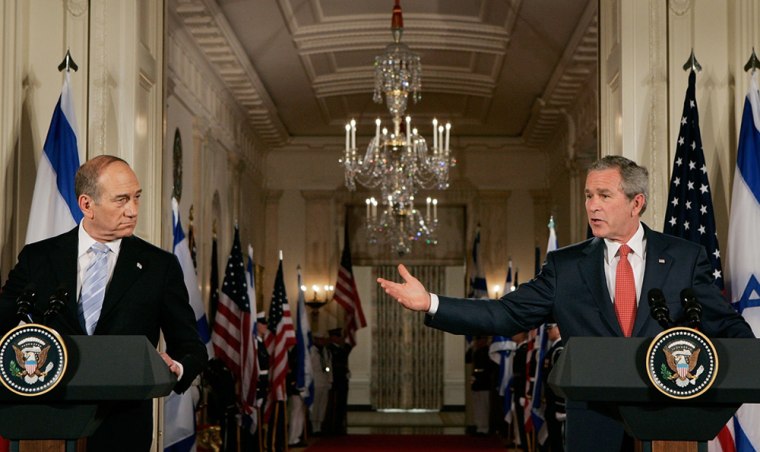President Bush on Tuesday praised Israeli Prime Minister Ehud Olmert’s plan for a unilateral redrawing of West Bank borders, saying it could be “an important step toward the peace we both support.”
But Bush, in his first White House meeting with the new Israeli leader, stopped short of a full endorsement. He said a negotiated agreement “best serves Israelis and Palestinians and the cause of peace.”
Bush also urged Israel to reach out to Palestinian President Mahmoud Abbas as an alternative to dealing with the Hamas-dominated Palestinian Authority.
Abbas “speaks out for peace and negotiations,” Bush said.
“Hamas must recognize Israel’s right to exist, must abandon terror, must accept all previous agreements,” Bush said. “No country can be expected to make peace with those who deny its right to exist, and who use terror to attack its population.”
Olmert said that if Hamas abandons its refusal to recognize Israel and its embrace of violence, “they will find us a willing partner in peace.”
But he said Israel would not enter an agreement with any party that refuses to recognize its right to exist. “We cannot wait indefinitely for the Palestinians to change,” he said.
Under his West Bank plan, Olmert intends — in the absence of a Palestinian peace partner — to remove isolated Israeli settlements in the territory, bolster major enclaves Israel says it intends to keep and draw a border by 2010.
Negotiations with Abbas encouraged
Bush administration officials have been urging Olmert to negotiate with Abbas over the West Bank withdrawal plan. However, it is unclear how much authority Abbas wields.
Bush called Olmert’s ideas “bold.”
While any final peace agreement must be the product of negotiations between Israel and the Palestinians, “the prime minister’s ideas could be an important step toward the peace we both support. I am encouraged by his constructive efforts to find ways to move the peace process forward,” Bush said.
On another major issue, both Bush and Olmert said Iran must not be allowed to build a nuclear arsenal.
“We determined that the Iranian regime must not obtain nuclear weapons,” Bush said. For his part, Olmert said, “This is a moment of truth. It is still not too late to prevent it from happening.”
Olmert was elected in March, taking over from Ariel Sharon, who suffered a massive stroke in January and has not recovered. Olmert, a career politician without close ties to the Bush administration, won election to succeed Sharon on a platform of expanding the withdrawal to include most of the Jewish settlements on the West Bank.
It was his first meeting with Bush since becoming prime minister, although Bush noted that they had first met in 1998 — when Olmert was mayor of Jerusalem and Bush was governor of Texas.
Also voiced concerns about Iran
Before his White House session with Bush, Olmert also discussed concerns about Iran with Defense Secretary Donald H. Rumsfeld in a 35-minute meeting at the Pentagon. The United States accuses Iran of secretly seeking nuclear weapons, and Israel fears the anti-Semitic rhetoric of Iranian President Mahmoud Ahmadinejad.
Olmert will speak to a joint meeting of both chambers of Congress on Wednesday.
Modest expectations for the White House session with Olmert reflected changed circumstances in Israel and the Palestinian territories since 2005, the last time Bush met with an Israeli counterpart. Then, the Israeli leader was former warrior and Bush friend Sharon, whose unilateral withdrawal from the Gaza Strip the administration cheered as a move toward peace.
Weeks after Sharon fell ill, Palestinian President Abbas’ secular Fatah Party was routed by the Islamic militant group Hamas in democratic elections, clouding the prospects for mutually negotiated borders with Israel. The Bush administration immediately cut off aid to a government now led by what it considers a terrorist group.
Abbas remains as president but has uncertain authority. A power struggle has spilled into armed confrontation between Hamas and Fatah security forces in the past week.
Olmert says that without a full Palestinian partner, he must press ahead with a withdrawal plan he says will consolidate Jewish residents and strengthen Israel’s security in the long run.
Resettlement could cost $10 billion
The White House has been unwilling to give a full green light to Olmert while so many questions remain about the scope, cost and consequences of what could be a $10 billion resettlement program.
With the United States and the European Union, Israel is boycotting the Hamas-led Palestinian government. Israel has made some overtures to Abbas, including a meeting last weekend between the Palestinian leader and Israeli Foreign Minister Tzipi Livni in Egypt, but Olmert remains skeptical.
Meanwhile, the House voted Tuesday to ban U.S. assistance to the Palestinian Authority and to bar diplomatic contacts with Hamas.
The chief sponsor of the measure, Rep. Ileana Ros-Lehtinen, R-Fla., said it would send a message to Hamas that the United States will not support a government run by terrorists.
The Senate is considering a less restrictive bill.
